SpaceX's Elon Musk turns to science fiction for Mars ship
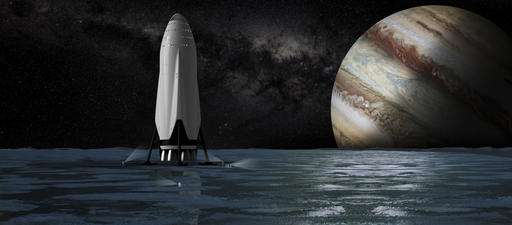
If SpaceX founder Elon Musk's plan to establish a city on Mars sounds like science fiction, then consider the name of his first passenger ship.
The answer lies in "The Hitchhiker's Guide to the Galaxy," the comic series about the travels and travails of Earth's last surviving man.
Musk is leaning toward the name "Heart of Gold," the starship in the novel wtih Infinite Improbability Drive.
"I like the fact that it's driven by Infinite Improbability," Musk said in presenting his long-awaited Mars colonization plan this week, "because I think our ship is also extremely improbable."
"But the acronym is not the best," he chuckled.
All aboard the HOG?
The name generated applause at the International Astronautical Congress in Mexico, where Musk provided elaborate details of his bold plans to fly scores of humans to Mars and set up a self-sustaining city with 1 million people, as big as San Jose, California.
For the past decade, Musk has borrowed from science fiction and fantasy when naming his rockets, engines, capsules and other space doodads.
Another billionaire's aerospace startup, Blue Origin, pays homage to America's original Mercury astronauts with its names. Long-established NASA and United Launch Alliance prefer mythology and astronomy.
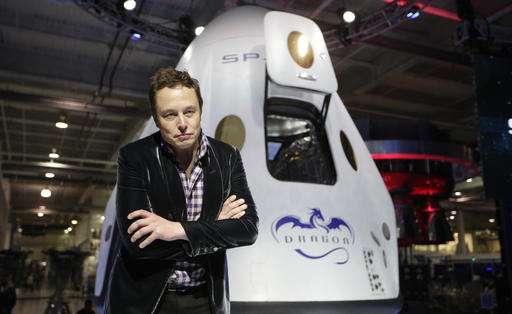
Musk already has plumbed "Star Wars" for names, as well as work by the late Scottish science fiction writer Iain M. Banks.
SpaceX's Falcon rocket is a nod to the Millennium Falcon piloted by Han Solo. It's powered by Merlin engines.
Then there are the two ocean platforms used for booster landings after liftoff: "Just Read the Instructions" and "Of Course I Still Love You" from Banks' 1988 novel "The Player of Games." ''The Hitchhiker's Guide to the Galaxy" dates back further; the late English author Douglas Adams published the novel in 1979, based on his hit radio series.
And there's the Dragon capsule currently used to haul cargo to the International Space Station for NASA and, in another year or two, U.S. astronauts.
The capsule was named for "Puff the Magic Dragon," a jab at those who scoffed when Musk founded the company in 2002 and set the space bar exceedingly high. SpaceX went on to become the first private company to launch a spacecraft into orbit and return it safely to Earth in 2010.

NASA traditionally has dipped into mythology for names: Projects Mercury and Apollo, and the Saturn V moon rocket. The space shuttles were named after seafaring ships of yore: Columbia, Challenger, Discovery, Atlantis and Endeavour. Shuttle prototype Enterprise was the exception, named after the "Star Trek" starship at fans' request.
United Launch Alliance also favors mythology, with its longtime Atlas rocket and even bigger, still-in-development Vulcan.
Then there are the constellations for inspiration. Orion, the hunter, is the spacecraft in which NASA plans to send astronauts beyond low-Earth orbit, most notably Mars. Cygnus, the swan, is Orbital ATK's capsule for space station shipments. Gemini, the twins, was NASA's two-man-per-capsule program that bridged Mercury and Apollo.
Orbital ATK also turned to the heavens for naming its Antares rocket after the superbright star.
At Blue Origin, the reusable suborbital rocket and capsule are called New Shepard for Alan Shepard, the first American to fly in space. The orbital version will be New Glenn for John Glenn, the first American to orbit the Earth. Company founder Jeff Bezos suggests New Armstrong may soon be in the offing for Apollo 11's Neil Armstrong, the first man to step onto the moon.
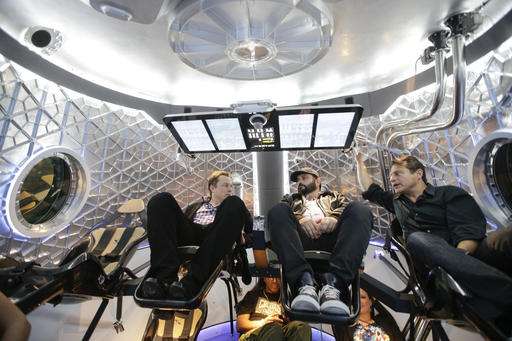
Optimistically, according to Musk, "Heart of Gold" could blast off from Florida in late 2024 and arrive at the red planet in 2025. A Mars-launching window is available only every 26 months.
"I would stress that's an aspiration and within the realm of possibility, but a lot of things need to go right," Musk said Tuesday.
Musk knows better than anyone things don't always go right in rocketry.
His Falcon 9 rockets are grounded for the second time in a year, this time by a massive fireball during prelaunch testing at the pad on Sept. 1.
"This is just a small thing on a long road," Musk told reporters after his address. "There will probably be other failures in the future."
He anticipates the risk will be greatest, in fact, for the pioneers aboard "Heart of Gold."
-
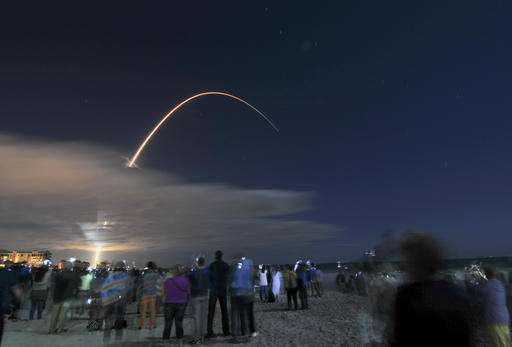
In this Tuesday, March 22, 2016 file photo made with a long exposure, hundreds line the beach north of the Cocoa Beach Pier in Florida to watch launch of the Orbital ATK Cygnus spacecraft on the United Launch Alliance Atlas V rocket at Cape Canaveral Air Force Station. Cygnus, the swan constellation, is Orbital ATK's capsule for space station shipments. (Malcolm Denemark/Florida Today via AP) -
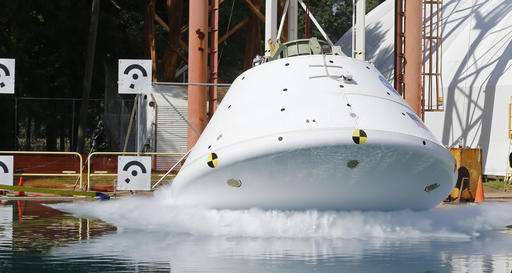
In this Thursday, Aug. 25, 2016 file photo, a mockup of NASA's Orion spacecraft hits the water in a simulated ocean splashdown test at NASA Langley Research Center in Hampton, Va. Orion, the hunter constellation, is the spacecraft in which NASA plans to send astronauts beyond low-Earth orbit, most notably Mars. (AP Photo/Steve Helber) -
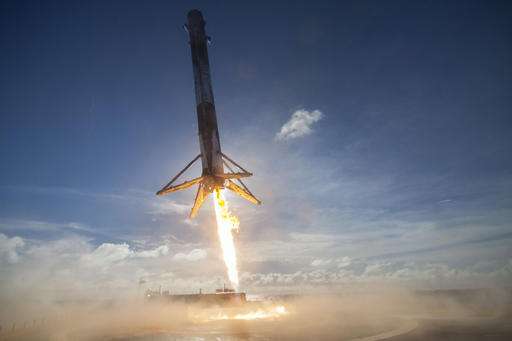
In this May 27, 2016 photo made available by SpaceX, their Falcon rocket booster lands on a platform in the Atlantic Ocean after launching a satellite into orbit. Its name is a nod to the Millennium Falcon piloted by Han Solo in the Star Wars movie series. It's powered by Merlin engines. (SpaceX via AP) -
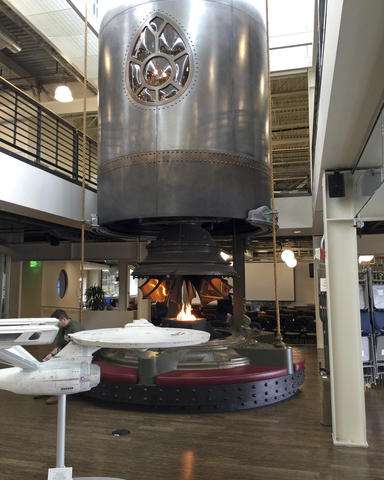
In this Tuesday, March 8, 2016 file photo, science fiction models, including the starship Enterprise from Star Trek and a Jules Vern-type space vessel, are displayed in the lobby of space venture company Blue Origin in Kent, Wash. (AP Photo/Donna Blankinship) -
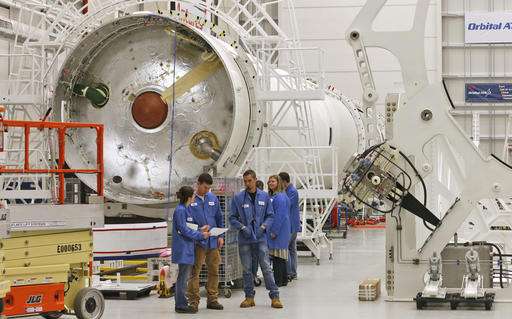
In this Dec. 17, 2015 file photo, workers look over documents in the assembly building for Antares rockets during a tour of the Mid-Atlantic Regional Spaceport at the NASA Wallops Flight Facility on Wallops Island, Va. Orbital ATK turned to the heavens for naming its Antares rocket after the superbright star. (AP Photo/Steve Helber, File) -
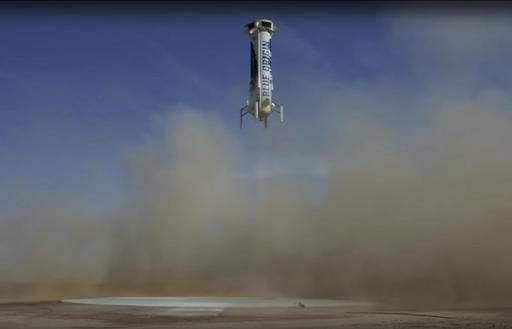
In this Sunday, June 19, 2016 image made from video provided by Blue Origin, the unmanned rocket New Shepard prepares to land in an area near Van Horn, Texas. The ship was named after astronaut Alan Shepard. The private space company run by Amazon CEO Jeff Bezos completed its fourth successful unmanned rocket launch and safe landing in West Texas using the same vehicle. (Blue Origin via AP) -
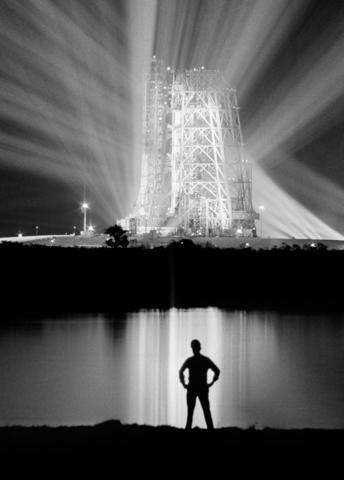
In this Dec. 19, 1968 file photo, spotlights illuminate the 363-foot-tall Saturn V booster rocket on the launch pad at Cape Kennedy, Fla., carrying the Apollo 8 spacecraft and its crew of three astronauts. NASA traditionally has dipped into mythology for names: Projects Mercury and Apollo, and the Saturn V moon rocket. (AP Photo)
More information: SpaceX: www.spacex.com/
© 2016 The Associated Press. All rights reserved.





















